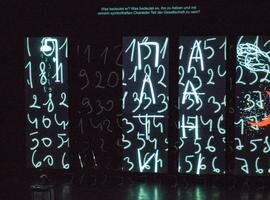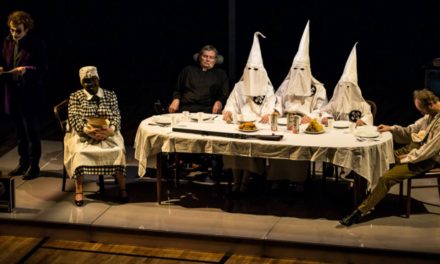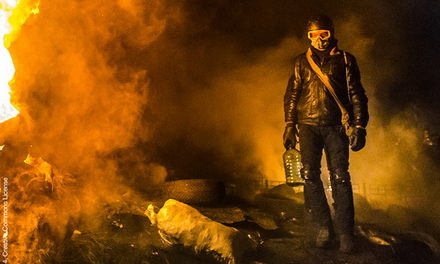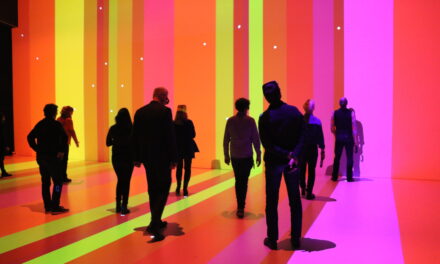Work on a documentary performance called End of Imitation started last autumn. It was shaped by artistic and personal introspections of young independent theatre professionals from Ukraine, after their visit to creative residencies that took place within the framework of European Theater Convention’s project, “Theatre, freedom, dialogue: European collaboration with theaters in Ukraine and Belarus.”
Program participants had a chance to spend six weeks in state-owned theaters in Germany, Austria, and Georgia. “Respect for human rights, egalitarianism, body culture, perspective thinking, tolerance, shared responsibility and horizontal relations, institutions transparency, and openness, integration of theatre into public life” (quote from press-release) are attributes of the professional environment, not typical for residents’ home countries. A rather long period of time spent within civil society and a close look at personal and public space models, that are very different from the ones at home, made it necessary to conceptualize artistic insights in the form of theatrical text. Is it possible at all to implement this experience in Ukrainian reality, and how? Is it possible or necessary to make a change to the totalitarian organization model of theatrical business? Are we, in fact, ready to adopt democratic values as a norm of life? Creation of this performance aimed to objectivize the according to problematique.

Photo Credits Anastasiya Gaishenets
It grew into a multistage project, where the performance became one of the stages (project curated by Yulia Fediv). Other activities included workshops by German theater expert Uwe Goessel, a roundtable on theatrical reform in Ukraine, discussions and resulting package of proposals to the Ministry of Culture of Ukraine from ETC working group. The initial range of issues was expanded, varying from existential problems of relations between a living being and the universe to general political subjects, such as corruption, double standards in society, irresponsibility and post-totalitarian behavior patterns. The main emphasis was put on imitation of different activities as a defining characteristic of Ukrainian society and political elite.
In fact, the challenge of raising pluralistic and global concerns was met by the authors of End of Imitation’s first version (directed by Pavel Yurov). Despite the use of vibrant forms and artistic boldness, it still looked rather like a socially loaded students’ party mashup than a sharp opinion on a certain topic. The statement had no obvious addressee, nor did it correlate with the pool of problems that had to be solved. After all, the authors did not deny it was just work-in-progress.
That is why we will consider only the second edition of End of Imitation, that featured artistic representation of project’s ambitious challenges, on a more intimate and sub-individual level. Having omitted rhetorical political questions to the universe, End of Imitation 2.0 concentrated on questions from one human being to another.
Problematique

Photo: Anastasiya Gaishenets
It is worth mentioning, that the scale of the initial problem is huge: 90% of young people who study or train abroad do not look forward to coming back to Ukraine. Despite ongoing reforms (in the theatrical sphere as well as in others), changes are next to invisible: competitive system does not function properly, theaters are still homes to self-censorship and rejection of new artistic forms. Under these conditions, young creatives feel “lack of oxygen.” Empty rhetoric and populist affirmations from officials, degradation of theatrical business and education, and indifference of artistic community do not add any optimism. Even a recent burst of activity in independent theater, a comforting silver lining in the state of things, does not mean overcoming the crisis since it is not consistent: a man cannot live in heroic mode for a prolonged period of time. State-owned theater gets older by day, but still, holds a strong grip on its place in the sun. Imitation substituting the real activity became the triggering cause that urged End of Imitation team to look for answers to rather painful questions in the form of theatrical expression.
Under microscope
If a person identifies themselves with a community, would it be correct to juxtapose them to “criminal incumbents,” or they are a part of the community, too? Can we exhibit some charges to corrupt greedy officials, or do we suffer from the same disease? Is there a hidden error in the genetic code? Pavel Yurov approaches the problems, announced in project thesis, from sub-intimate level. In the beginning, it is rather hard to distinguish them. Big words about corruption, imitation of reforms, disrespect of personality, and lack of opportunities for personal fulfillment of young creative people do not appear in the play’s text (writers Yulia Gonchar, Pavel Yurov). Drama in End of Imitation 2.0 is absolutely free from posterization and inventive vocabulary. Instead, through characters’ intimate experiences, their little victories over own weaknesses and defeats to the greater world we witness their path of self-affirmation and personal reconciliation, the path of recognizing themselves as responsible living beings who are worth to be respected.
How is it done?
Photo: Alyona Ovramenko
The show consists of five documentary stories, performed by three actors (Darya Palagnyuk, Olga Popova, and Andriy Palatnyi). Some stories originate from mentioned actors, others come from residency program participants. Recognizing the fact of being pulled out from one’s comfort zone, from a familiar context, becomes a dominant plotline. The characters realize their individuality and engage in reflections over their trade. Specific kind of teamwork provided equal opportunities for every member to collaborate in the creative process. Although the director of the show is Pavel Yurov, actors got a chance to make their creative input into End of Imitation. In spite of the fact that there was a large number of authors, the performance’s integrity did not suffer.
Quite the contrary: the case of End of Imitation’s work in micro groups shows that theatrical production can function without the hierarchic model, where there is no “boss” and where all participants can contribute and compromise.
Digital and documentary

Photo: Anastasiya Gaishenets
One of the project’s specialties is the work of Alyona Ovramenko, an animation artist. Her skill, that has not even received a proper Ukrainian language equivalent yet, is Live Animation Mapping. On her tablet, Alyona animates real-time graphic images, that are then projected onto dynamic white flat modules (scenography by Yaroslava Sydorenko). In the first edition of the performance mapping was merely illustrative (indeed, enriching and verifying the action on stage), but in version 2.0 the artist’s work became more metaphorical, and appeared as a self-sufficient artistic statement within the project: a shower with digits flowing instead of water, a red tram that counts bars of life together with metronome on forestage, motley silhouettes of a crowd, and hypnotic circles from a story about a dream, everything is closely integrated into action and is perceived as action’s immediate extension. It is hard to overestimate the importance of this successful synthesis of drama theater and digital art.
Some scenes in End of Imitation 2.0 show very expressive use of space, mixing up living actors and digital images. Actors, hidden behind white stage modules, sit around the table and pronounce their lines in turns (story by Pavel Yurov). At the same moment, their faces are shown through webcams on the projection screen. The story features different women’s names, it is actually torn between three alter egos. This kind of documentary text fragmentation makes traumatizing intimate experiences more objective and distant. Defragmented ego enters an argument with itself. Another keynote and a recognizable element in the onstage text in this story is “she.” Her name changes all the time, “she” is called Lena, Katya, Oksana… The world is torn into pieces. But “me” gets a chance to talk to itself, and there is a sort of consolation in it. The webcam footage, used excessively by young directors in recent years, feels absolutely reasonable both on compositional and dramaturgical levels. It is worth mentioning that sound designer Sergiy Avdeev works in real time, just like his colleague Alyona. Performance’s opening story (by Yaroslava Sydorenko) is based on author’s memories of her first steps as a stage designer while studying in Germany, namely an episode when she had to make angel’s wings from paper. This story is accompanied by the sound of scissors that cut cardboard paper, adding to the tone and mood, that keep tension in the air. In this story lines are split between two actresses. The girls narrate Yaroslava’s story in turns, synchronizing the text with some sort of sign language, but in fact, it is just teen gesture greeting. The changing levels of main character’s integrity are reflected by changing distance between performers: the farther they stand from each other, the more mal-synchronized are their gestures, the more she is filled with doubt and despair.
The only story that was dramaturgically built into performance’s construction, but does not include experience from the residence, is Darya Palagnyuk’s story of her relations with the chosen profession. Partly Darya’s story took place in the process of work in the project, that is why in her case the time that separates the event and the insight is the shortest from all. Her story starts with the word “homage.” Darya reflects on the meaning of this word. Disrespect hurts badly. Hierarchy in the society leads to cases of disrespect experienced by a person just because they are, for example, a student, or unemployed, or a woman, etc. Reasons are countless. What is important, is the very principle of thinking, that allows this disrespect. We become neglected while being lied to. But does a liar have some self-respect while consciously lying? Some manage to settle a compromise with their conscience, some just drop their promises… through disco-style adventures, light flirt, and conscious choices, End of Imitation 2.0 brings us to the main question: “Do we have respect for ourselves?”
This article was originally published on theater-ua.com.ua. Reposted with permission. Read the original article.
This post was written by the author in their personal capacity.The opinions expressed in this article are the author’s own and do not reflect the view of The Theatre Times, their staff or collaborators.
This post was written by Anastasiia Gaishenets.
The views expressed here belong to the author and do not necessarily reflect our views and opinions.

















